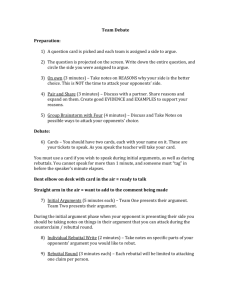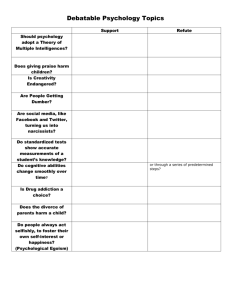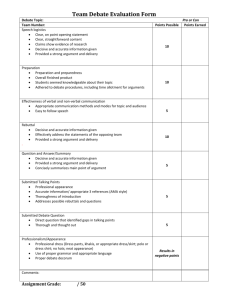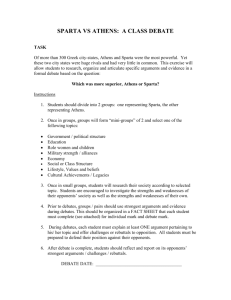Culminating Activity: Great Debates
advertisement
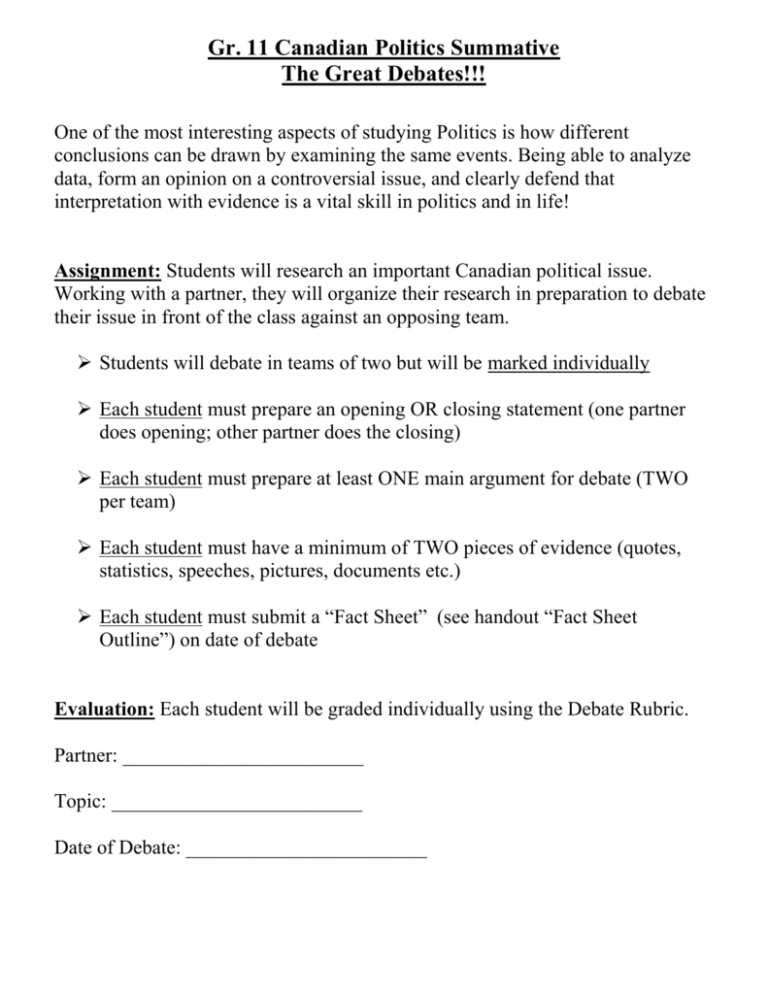
Gr. 11 Canadian Politics Summative The Great Debates!!! One of the most interesting aspects of studying Politics is how different conclusions can be drawn by examining the same events. Being able to analyze data, form an opinion on a controversial issue, and clearly defend that interpretation with evidence is a vital skill in politics and in life! Assignment: Students will research an important Canadian political issue. Working with a partner, they will organize their research in preparation to debate their issue in front of the class against an opposing team. Students will debate in teams of two but will be marked individually Each student must prepare an opening OR closing statement (one partner does opening; other partner does the closing) Each student must prepare at least ONE main argument for debate (TWO per team) Each student must have a minimum of TWO pieces of evidence (quotes, statistics, speeches, pictures, documents etc.) Each student must submit a “Fact Sheet” (see handout “Fact Sheet Outline”) on date of debate Evaluation: Each student will be graded individually using the Debate Rubric. Partner: ________________________ Topic: _________________________ Date of Debate: ________________________ Great Debates: Canadian Politics Topic List FOR / YES DEBATE QUESTIONS AGAINST / NO 1. Is Canada doing enough to combat Global Warming? 2. Do Trade Unions to more harm than Good? 3. Do the CRTC Regulations Promote or hinder Canadian Talent? 4. Do the Western Provinces deserve to have greater constitutional Powers? 5. Do we need Electoral Reform in Canada? 6. Was Trudeau’s usage of the War Measures Act during the FLQ Crisis Justified? 7. Should Canada increase its Foreign Aid Budget? 8. Should Canada increase its rate of Immigration during periods of economic crisis? 9. Should the Free Trade Agreement (FTA) be abolished? 10. Should Canada continue its military operations in Afghanistan? 11. Should the Alberta Tar Sands project be scrapped? 12. Are Noam Chomsky’s Criticisms of the Media valid? 13. Should the Goods and Services Tax be scrapped? Please Note: Debate topics listed above mirror the topics covered during the Independent Study Unit (ISU) presentations. If there is a political topic not listed above that you would like to debate, please see Mr. Watson for approval. Suggested topics should cover what we have extensively studied or discussed during the politics course. 2 Politics Debates: Fact Sheet Outline Each student must complete his/her own fact sheet and submit on date of debate! NAME: ________________________________________ DATE: __________________________ DEBATE QUESTION: __________________________________________________________________ SIDE: YES NO DESCRIPTION OR INTERPERATION OF MY SIDE OF DEBATE This can be used for opening and closing statements: a) Introduction of team members b) Provide any necessary definitions c) Give a brief scenario or description of the political issue / event d) Give a statement of what you intend to prove e) Provide a brief overview of two main arguments / evidence f) Restate debate side you are proving 3 MAIN ARGUMENT EVIDENCE SOURCE (Footnote) EVIDENCE SOURCE (Footnote) OTHER EVIDENCE SOURCE (Footnote) ARGUMENTS EXPECTED OPPONENTS TO MAKE PLANNED REBUTTLES BIBLIOGRAPHY / Works Cited (proper format please!) 4 POLITICS DEBATE STRUCTURE (Gr. 11) Opening Statement FOR AGAINST 1 minute 1 minute Argument #1 Argument #1 FOR Rebuttal AGAINST Argument #1 AGAINST Rebuttal FOR 2 minutes 1 minute 2 minutes 1 minute Argument #2 2 minutes Argument #2 FOR Rebuttal AGAINST Argument #2 AGAINST Rebuttal FOR 1 minute 2 minutes Free For All 5 minutes Closing Statement AGAINST FOR 1 minute 1 minute Open Questions (by class to the debaters 1 minute 5 minutes TOTAL = 26 minutes 5 DEBATE RUBRIC Knowledge & Understanding -Political Knowledge Thinking & Inquiry -connecting evidence -rebuttals Communication -clarity of ideas -delivery Application -fact sheet LEVEL 4 LEVEL 3 LEVEL 2 LEVEL 1 -student provides exceptionally detailed and accurate information in their opening / closing statements and main arguments -student provides proficient details and accurate information in their opening / closing statements and main arguments. - skilfully draws connections by using more than two pieces of evidence that overwhelmingly supports argument - clear and thorough preparation for opponents points with exceptional rebuttals - student exceptionally expresses ideas clearly and concisely to audience in a confident manner - student skillfully varies pitch, tone, uses humour and appropriate language to convince audience - student submits an exceptional fact sheet that is detailed, concise, and well organized and displays extensive research - makes connections by using two pieces of evidence that effectively supports argument - student has prepared for points by opponent and responds proficiently - student provides adequate information that is accurate but needs more details in their opening / closing statements and arguments - student presents some evidence to support arguments and conclusions - adequate preparation for opponents’ arguments but needs stronger rebuttals -student provides few details or inaccurate or irrelevant information in their opening / closing statements and arguments - student offers little to no evidence to support argument - student seems totally unprepared for opponents’ points and makes few rebuttals - student speaks clearly and confidently to audience - student uses appropriate language, volume, tone and humour to convince audience - student needs to speak more clearly and confidently - adequate use of language, volume, tone to convince audience - often hard to hear student or student seems lost or confused -student needs to use volume, tone to be more convincing - student submits a complete fact sheet that is clear and well organized and shows developed research - student submits fact sheet that is complete but could be more detailed and concise and contain more research -student submits a fact sheet that is missing information, details and clarity Comments Marks /10 /10 /10 /10 TOTAL /40 6
